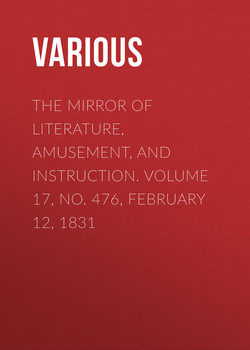The Mirror of Literature, Amusement, and Instruction. Volume 17, No. 476, February 12, 1831

Реклама. ООО «ЛитРес», ИНН: 7719571260.
Оглавление
Various. The Mirror of Literature, Amusement, and Instruction. Volume 17, No. 476, February 12, 1831
NATURE REVIVING
POLISH PATRIOT'S APPEAL
THE NATURALIST
ANECDOTES OF PARROTS
RETROSPECTIVE GLEANINGS
DITTY BY QUEEN ELIZABETH
NOTES OF A READER
QUARTERLY REVIEW. No. 87
LIBERALISM AND MUSIC
TURKISH MUSICAL GUSTO
RODE, THE VIOLINIST
PROGRESS OF SCIENCE
SELECT BIOGRAPHY
THOMAS HOPE, ESQ
SPIRIT OF THE PUBLIC JOURNALS
BACCHANALIAN SONG
THE SNOW-WHITE VIRGIN
THE SELECTOR; AND LITERARY NOTICES OF NEW WORKS
ROMANCE OF HISTORY
THE GATHERER
THE POPE PUZZLED
CHANGING SIDES
TO MOLLY
KINGS OF FRANCE
PANDORA'S BOX
SQUALL AT SEA
Отрывок из книги
A parrot belonging to the sister of the Comte de Buffon (says Bingley,) "would frequently speak to himself, and seem to fancy that some one addressed him. He often asked for his paw, and answered by holding it up. Though he liked to hear the voice of children, he seemed to have an antipathy to them; he pursued them, and bit them till he drew blood. He had also his objects of attachment; and though his choice was not very nice, it was constant. He was excessively fond of the cook-maid; followed her everywhere, sought for, and seldom missed finding her. If she had been some time out of his sight, the bird climbed with his bill and claws to her shoulders, and lavished on her caresses. His fondness had all the marks of close and warm friendship. The girl happened to have a very sore finger, which was tedious in healing, and so painful as to make her scream. While she uttered her moans the parrot never left her chamber. The first thing he did every day, was to pay her a visit; and this tender condolence lasted the whole time of the cure, when he again returned to his former calm and settled attachment. Yet this strong predilection for the girl seems to have been more directed to her office in the kitchen, than to her person; for, when another cook-maid succeeded her, the parrot showed the same degree of fondness3 to the new comer, the very first day."
Bingley also says, "Willoughby tells us of a parrot, which when a person said to it, 'laugh, Poll, laugh,' laughed accordingly, and the instant after screamed out, 'What a fool to make me laugh.' Another which had grown old with its master, shared with him the infirmities of age. Being accustomed to hear scarcely anything but the words, 'I am sick;' when a person asked it, 'How do you do, Poll? how d'ye do?'—'I am sick,' it replied, in a doleful tone, stretching itself along, 'I am sick.'"
.....
Goldsmith says, "That a parrot belonging to King Henry VIII. having been kept in a room next the Thames, in his palace at Westminster, had learned to repeat many sentences from the boatmen and passengers. One day sporting on its perch, it unluckily fell into the water. The bird had no sooner discovered its situation, than it called out aloud, 'A boat, twenty pounds for a boat.' A waterman happening to be near the place where the parrot was floating, immediately took it up, and restored it to the king; demanding, as the bird was a favourite, that he should be paid the reward that it had called out. This was refused; but it was agreed, that as the parrot had offered a reward, the man should again refer to its determination for the sum he was to receive. 'Give the knave a groat,' the bird screamed aloud, the instant the reference was made."
Mr. Locke, in his "Essay on the Human Understanding," has related an anecdote concerning parrots, of which (says Bingley) however incredible it may appear to some, he seems to have had so much evidence, as at least to have believed it himself. It is taken from a writer of some celebrity; the author of Memoirs of what passed in Christendom from 1672 to 1679. The story is this:—
.....